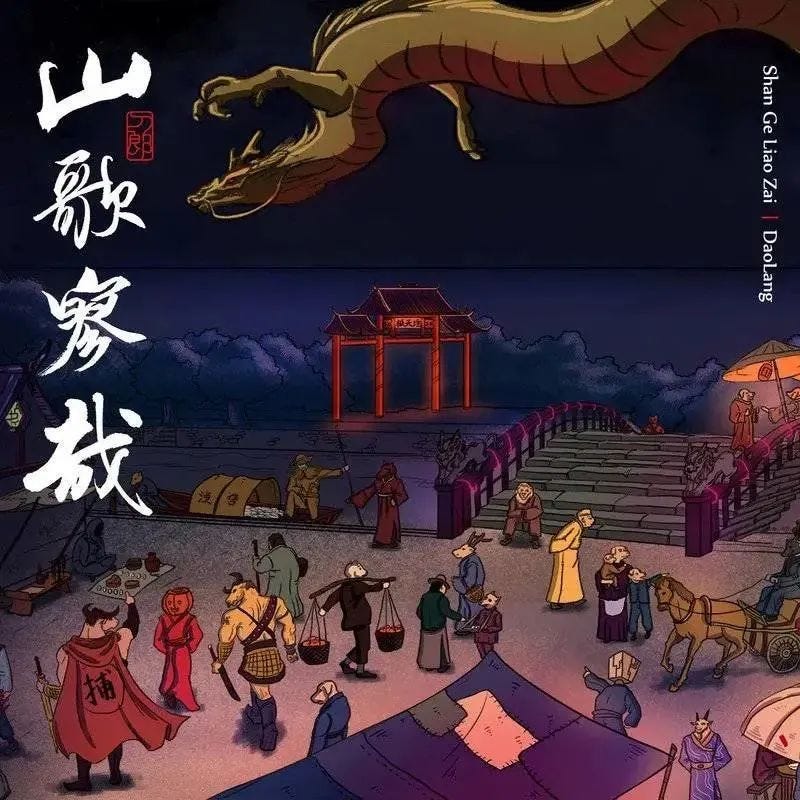Welcome to RealTime Mandarin—a multimedia resource to immerse you in the latest Chinese language trends, inspire you to practice and improve your Mandarin every week, and empower you to communicate with confidence.
Subscribe now to get the next issue straight to your inbox!
Folk singer Dāo Láng 刀郎 has released a new album, Reverberant Folk Songs (山歌寥哉 shāngē liáozāi).
He originally shot to stardom in 2004:
In 2004, Dao Lang burst onto the scene with the album "The First Snow in 2002". Without any publicity in an era of little Internet access, he sold 2.7 million copies of the original version, and nearly 20 million including pirate versions, out-selling Jay Chou.
2004年,刀郎凭借专辑《2002年的第一场雪》横空出世,在没有任何宣发且网络也不发达的情况下,光是正版就卖出了270万张,卖了近2000万张,销量力压周杰伦。 [1]
Reverberant Folk Songs is his first release in over a decade.
One song on his new record has caused controversy and heated discussions in China, believed to be taking aim at a number of celebrities in China's music world.
Released as a single on 19 July, Land of the Rakshasas and the Sea Market (罗刹海市 luō chà hǎi shì), was downloaded or streamed over 8 billions times by 1 August.
Note: The Rakshasa are a mythical race. The Chinese word 罗刹 luó chà is a transliteration of the original Sanskrit (rākṣasa राक्षस,).
The title of the song, and the lyrics, are from a short story of the same name in Strange Tales from a Chinese Studio (聊斋志异 liáozhāi zhìyì), published in 1766 by Qing dynasty writer, Pú Sōnglín 蒲松林.
In Pu’s story, the land of the Rakshasas is a world in which everything is upside-down: The more human-like or beautiful someone is, the lower they are in society; the uglier and more beast-like they are, the higher and more powerful they become (以丑为美 yǐ chǒu wèi měi).
The lyrics of the song, so some observers believe, are a veiled criticism of well-known Chinese singer and musical judge, Nà Yīng 那英, and a number of other celebrities.
Na Ying was the head judge at the 2010 Music Billboard 10-Year Ceremony (2010年音乐风云榜十年盛典). Dao Lang was shortlisted for the most influential artist of the 2000’s award.
Selecting her most influential singer of the decade, Na Ying said:
Dao Lang’s songs are not aesthetically pleasing.
他不具备审美观点。
Dao Lang disappeared from public view shortly after that.
So his reappearance years later has surprised and delighted music fans.
But is Dao Lang getting his own back on his critics?
Everyone has their own take on song lyrics. Some people think it's implicitly criticising other celebrities, while others just see it as mere lyrics.
歌词这东西是“智者见智”,有人觉得是在内涵明星,有人却只觉得是歌词而已。 [3]
He has since said the interpretations are incorrect, but most people following the story don’t buy that.
Geremie R. Barmé does a much better job of explaining it than I do in this excellent piece. (Including much better translations!)
It’s also what we explore this week!
Favourite Five
1. 内涵 nèi hán
implicit meaning, connotation; insinuate
歌词也看了好几遍,怎么没看出是在内涵那英这些人啊 - I've read the lyrics several times, but I still didn't catch how it's subtly taking a dig at famous singers like Na Ying. [3]
Note: Here it's a verb which means 'to imply' with a negative connotation.
2. 围攻 wéi gōng
surround and attack, besiege
人们很容易从“刀郎被诸多音乐大腕儿围攻和排挤”,联想到既得利益者、资源垄断者对草根儿阶层的围剿和打压 - People easily associate "Dao Lang being surrounded and excluded by many music celebrities" with the suppression and oppression of the grassroots by established interest groups in the industry. [1]
3. 刨坟 páo fén
to be ruthless in one's criticism
文人骂人,句句刨坟,却又看不到脏字 - When scholars attack, it can be scathing and ruthless, yet no dirty words can be seen. [1]
Note: Also an internet slang word meaning someone reviving an old or long-forgotten discussion thread or topic.
4. 口水歌 kǒu shuǐ gē
pop song with catchy lyrics and simple melody
创作歌曲不仅仅只是口水歌,还是需要文化修养的 - Writing songs is not just about making catchy tunes, it also requires cultural cultivation. [2]
Related:
神曲 shén qū - "divine song" - a hit song
洗脑 xǐ nǎo - "brainwashing" catchy song that gets stuck in your head
神坛 shén tán - The altar of gods; metaphorically used to describe the highest level of musical achievement
朗朗上口 lǎng lǎng shàng kǒu - melodious and easy to sing; catchy
5. 十年磨一剑 shí nián mó yí jiàn
sharpen a sword for ten years
归来终复仇,这样的设定实在太带感太解气,此歌一出,立刻火上了热搜,火出了圈 - After ten years of sharpening his sword, he has returned for revenge. It's an emotional release. As soon as this song came out, it immediately hit the top search rankings on social media and became hugely popular. [1]
More: Read this week’s China Project Phrase of the Week for more.
Related:
君子报仇,十年不晚 jūn zǐ bào chóu, shí nián bù wǎn - A gentleman will hold onto a grudge for 10 years before taking revenge
Consuming the Conversation
Useful Words
6. 吊诡 diào guǐ
eerie, uncanny, mysterious
但吊诡的是,网友们仿佛瞬间就领悟了刀锋所指,自发做了阅读理解 - But what's uncanny is that netizens all read between the lines and seemed to instantly comprehend the intended meaning. [1]
7. 旧怨 jiù yuàn
old grudges, past grievances
那英等人和刀郎的旧怨,在互联网上早已不是什么新鲜事了 - The old grudges between Na Ying and Dao Lang are no longer something fresh on the internet. [1]
8. 挖苦 wā kǔ
mock, taunt, make fun of
杨坤也挖苦说,“刀郎那是音乐吗" - Yang Kun also taunted, "Is Dao Lang's content even considered music?" [1]
9. 草根 cǎo gēn
grassroots; ordinary people at the bottom of society
刀郎代表的是艰难打拼的草根儿和底层 - Dao Lang represents the struggling grassroots and the underprivileged. [1]
10. 大腕 dà wàn
big names; influential figures in an industry
歌坛大腕儿们代表的是已经固化的上层群体 - The big names in music represent the already solidified upper class of that industry. [1]
11. 正统 zhèng tǒng
legitimate, traditional
替他以往的遭遇发声,惩戒了一群自诩“正统”的人 - Speaking up for his past experiences, he punished a group of self-proclaimed "orthodox" individuals. [2]
12. 抵牾 dǐ wǔ
contradiction
其实揭示了世纪初两种音乐生产方式之间的抵牾 - In fact, it reveals the conflict between two ways of music-making at the beginning of this century. [4]
Three-character phrases
14. 不相干 bù xiāng gān
unrelated
评论远比点赞多,且每条都跟视频内容不相干 - There are far more comments than likes, and each one is unrelated to the content of the video. [1]
15. 野路子 yě lù zi
unconventional approach















